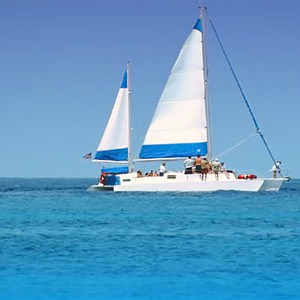Please Register / Login to take part in discussions about the Virgin Islands.
We plan to visit STT in mid July. I have read a little about no see ums. Are they something I need to be to concerned about? Any advice? Thanks!
Concerned? Depends on your reaction to them if encountered.
Late afternoon is when they seem to show up (definately NOT an all day occurance), beaches mostly - but NOT all beaches as far as I can tell.
Within the last couple of weeks, I have learned, with great satisfaction/relief, that if you find yourself itching more than just an ordinary mosquito bite might cause, and you suspect possible no seeums - grab some Benyadryl Itch Stopping Gel.
According to the bottle it - "stops your itch at the source by blocking the histamine that caused itch". And boy did it shut down the allergic reaction that I seemed to be having from them.
You may not be affected at all. My first time here, I wasn't aware of being bitten at all, yet a friend who was with me on the beach and all our activities, ended up with bites all over his legs - like measles or something.
Pleae don't worry about them for a second.....just be prepared by using the simple solution I found. The Gel is more topically and directly applied than the spray that is also available.
Hello Smile,
As mentioned usually they are on the beach or very close to the beach and typically its at sunset they come out and when its rainy and overcast. They are called sand flies among other names. They also hang out close to stagnent water and around rotting organic material so if you are hiking on St. John on the trails you might encounter them along the trails. To keep them away on the trails you might use some bug repellent or wear light long pants. For beaches they shouldn't bother you unless its late afternoon.
--Islander
Smile:
As a native Floridian, no see-ums are common here too. I have also read about them on STT and we plan on visiting in late July also. The one thing I have found that works here in Florida is NOT wearing any perfume when you go to the beach or hang out at a bar near the shoreline. They seem to be attracted to the smell and when I don't wear cologne, I never get bit.
A good bug repelant works too - try skin-so-soft. I am asuming they are the same pesky bugs we have here in Florida so when I go down for our vacation I'll be sure to spray on bug repelant and not spray on cologne. 🙂
Hello Paul
What are "no see ums"? We are coming in June & I have not read or heard anything about this.
Hello Chimene,
They are little insects. They are so little they are often called 'no see ums', Also called sandflies. As mentioned often they are on the beaches at sunset, around stagnent water or in forested areas around decaying leaves ect.
--Islander
Chimene,
Many people know them as gnats (g is silent). We also call them "flying teeth"!
Ted
What are No-Seeums? Having recently become more curious than I ever wanted to about this subject , and knowing that it frequently comes up on this message board, I did a bit of research on the topic.
Sand flies are a small blood sucking gnat which are prevalent along coastal territories and regions with a lot of water, dampness and marshland. Also known as Punkies, Black Gnats and No Seeums, these annoying tiny flies are very persistent and prolific. This article will highlight some basic biology about Sand Flies and then offer treatment options so you can help to minimize the discomfort and unpleasantness experienced when sand flies are active in your yard. Sand flies are small - usually less than 1/8 inch long - but pack a lot of bite for their size. Only females bite but since she needs several blood meals before she lays eggs, they seem to linger longer than other flying pests like mosquitoes. There are many species of sand fly which are found primarily along coastal water ways where marshland and swamps provide the damp, wet environment in which they like to live.
Next - in response to Skin-So-Soft or not wearing perfume the following:
By not being able to "smell" people, they are not able to track them down. No Seeums track people by detecting two gases we release called Octenol and CO2. These gases are exhaled when we breathe. As we sit outside exhaling, these gases will permeate out and flow with the local air current. They can be detected by No Seeums as well as mosquitoes for over 100 yards. Once these biting pests get on the trail, they will follow it back to it's source eagerly searching for a blood meal.
I've found that prevention is worth the effort and always take bug repellant that is fairly high (~28%) in DEET. Two things I've noticed about the spray though, it will discolor sandals and it will ruin nail polish. I assume this is due largely to the propellant and would happen with any spray product applied near the feet. To solve this problem I spray it on barefoot and cover my toes with a napkin.
When I've forgotten to spray (or missed a spot) I've been bitten, and on me these things itch like the devil and last for days. Therefore I recommend calling your physician and asking for a prescription of .05% Diprolene lotion. Benadryl didn't help me a bit, but this stuff really does the trick. This falls into the "better safe than sorry" category and I won't travel without it.
Just FYI for anyone looking for a deet free alternative. I read on this board a while back about a product called Bite Blokcer. The person posting said that it worked as well as any deet product he had tried without the toxic ingredients. I haven't tried it, but have stocked up on it for our trip next month. Below is a section from their website and web address. www.homs.com. There is also information on studies from Duke University regarding deet and other interesting articles.
*Bite Blocker™ tropical insect repellent is here!
Tropical, all-natural mosquito and black fly "DEET-FREE" insect repellents. Proven 97% Effective! Sweat-proof, Water-proof and Child-Safe, with 4-8 hours of protection! The New England Journal of Medicine proves that HOMS Bite Blocker™ is as effective as a DEET insect repellent but much safer since it is DEET-FREE! Please visit our Efficacy section for studies on our current formulations.


